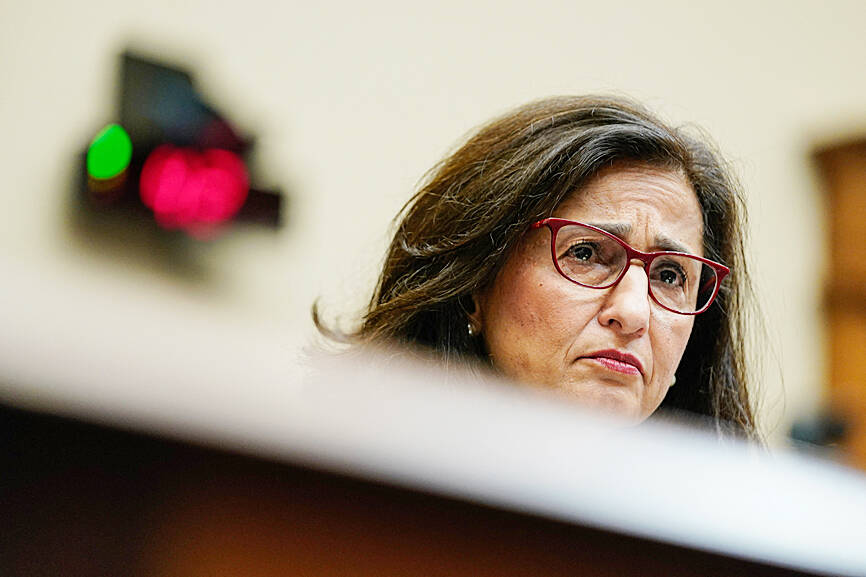Columbia University president Minouche Shafik resigned on Wednesday, nearly four months after the Ivy League university’s handling of campus protests over Israel’s war in Gaza was criticized by pro-Israel and pro-Palestinian sides alike.
“It has also been a period of turmoil where it has been difficult to overcome divergent views across our community,” Shafik said in an e-mail to staff and students. “This period has taken a considerable toll on my family, as it has for others in our community.”
Shafik said her departure “at this point would best enable Columbia to traverse the challenges ahead.”

Photo: AFP
She said she made the announcement so new leadership could be in place before the new term begins.
Columbia was rocked in April and May as protesters occupied parts of the Upper Manhattan campus in opposition to Palestinian civilian deaths in Gaza, resulting in hundreds of arrests. The demonstrators denounced Shafik for calling police onto campus to halt the demonstrations, while pro-Israel supporters castigated her for failing to crack down sufficiently.
Katrina Armstrong, Columbia’s executive vice president for health and biomedical services, would serve as the interim president, according to the university Web site.
US Representative Elise Stefanik from upstate New York, who castigated Shafik and other university leaders in US congressional hearings over Gaza protests nationwide, welcomed her resignation on X, saying it was “overdue” because of her failure to protect Jewish students.
Shafik, an Egyptian-born economist who holds British and US nationality, was previously deputy governor of the Bank of England, president of the London School of Economics and Political Science, and deputy managing director at the IMF.
She became the 20th president of Columbia University in July last year.
After protesters set up dozens of tents and demanded that the university sell its Israeli assets, university officials tried to negotiate an agreement with protesters on dismantling the camps.
As talks failed, Shafik on April 18 took the unusual step of asking New York police to enter the campus, angering many rights groups, students and faculty.
More than 100 people were arrested and the tents were removed from the main lawn, but within a few days, the encampment was back in place. The university called police back in on April 30, when they arrested 300 people at Columbia and the City College of New York.
Shafik then asked police to stay until at least May 17 — two days after graduation — “to maintain order and ensure that encampments are not re-established.”
The current Gaza conflict was triggered on Oct. 7 last year when Palestinian fighters from Hamas attacked Israel, killing 1,200 and taking about 250 hostages, according to Israeli tallies.
Israel’s subsequent assault on the Hamas-governed enclave has since killed about 40,000 Palestinians, according to the local health ministry, while displacing nearly the entire population of 2.3 million, causing a hunger crisis and leading to genocide allegations at the World Court that Israel denies.

A car bomb killed a senior Russian general in southern Moscow yesterday morning, the latest high-profile army figure to be blown up in a blast that came just hours after Russian and Ukrainian delegates held separate talks in Miami on a plan to end the war. Kyiv has not commented on the incident, but Russian investigators said they were probing whether the blast was “linked” to “Ukrainian special forces.” The attack was similar to other assassinations of generals and pro-war figures that have either been claimed, or are widely believed to have been orchestrated, by Ukraine. Russian Lieutenant General Fanil Sarvarov, 56, head

SAFETY FIRST: Double the number of police were deployed at the Taipei Marathon, while other cities released plans to bolster public event safety Authorities across Taiwan have stepped up security measures ahead of Christmas and New Year events, following a knife and smoke bomb attack in Taipei on Friday that left four people dead and 11 injured. In a bid to prevent potential copycat incidents, police deployments have been expanded for large gatherings, transport hubs, and other crowded public spaces, according to official statements from police and city authorities. Taipei Mayor Chiang Wan-an (蔣萬安) said the city has “comprehensively raised security readiness” in crowded areas, increased police deployments with armed officers, and intensified patrols during weekends and nighttime hours. For large-scale events, security checkpoints and explosives

PUBLIC SAFETY: The premier said that security would be tightened in transport hubs, while President Lai commended the public for their bravery The government is to deploy more police, including rapid response units, in crowded public areas to ensure a swift response to any threats, President William Lai (賴清德) said yesterday after a knife attack killed three people and injured 11 in Taipei the previous day. Lai made the remarks following a briefing by the National Police Agency on the progress of the investigation, saying that the attack underscored the importance of cooperation in public security between the central and local governments. The attack unfolded in the early evening on Friday around Taipei Main Station’s M7 exit and later near the Taipei MRT’s Zhongshan

REBUFFED: In response to Chinese criticism over recent arms sales, Washington urged Beijing to engage in meaningful dialogue instead of threats and intimidation Washington’s long-term commitment to Taiwan would not change, the US Department of State said yesterday, urging Beijing to stop pressuring Taiwan and engage in meaningful bilateral dialogues. The remarks came in response to a backlash from Beijing about Washington’s latest approval of arms sales to Taiwan. The US Defense Security Cooperation Agency said in a statement on Wednesday that the Taipei Economic and Cultural Representative Office in the US has asked to purchase an arms package, including Tactical Mission Network Software; AH-1W helicopter spare and repair parts; M109A7 self-propelled howitzers; HIMARS long range precision strike systems; tube-launched, optically tracked, wire-guided missiles; Javelin